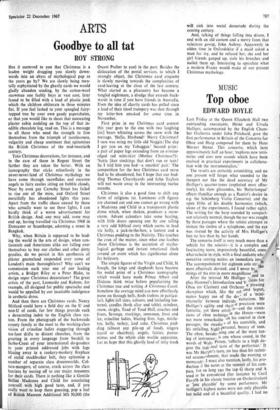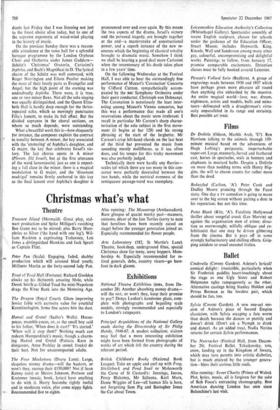Top oboe MUSIC
EDWARD BOYLE
Last Friday at the Queen Elizabeth Hall two outstanding executants, Heinz and Ursula Holliger, accompanied by the English Cham- ber Orchestra under John Pritchard, gave the first performance in Britain of the Concerto for Oboe and Harp composed for them by Hans Werner Henze. This concerto, which lasts approximately half an hour, 'explores new terri- tories and uses new sounds which have been evolved in practical experiments in collabora- tion with the instrumentalists.'
The results are certainly astonishing, and no one, present will forget what sounded to the inexpert ear like the dead accuracy of Mr Holliger's quarter-tones (exploited most effec- tively), his slow glissandos, his 'fluttertongue' effects (familiar enough as a flautist's device in e.g. the Schonberg Violin Concerto), and the open fifths of his double harmonics (which, alone of the experiments, I found rather ugly). The writing for the harp sounded by compari- son relatively normal, though the ear was caught by those passages where the soloist attempts to imitate the timbre of a xylophone, and the eye was riveted by the activity of Mrs Holliger's feet no less than by her hands.
The concerto itself is very much more than a vehicle for the soloists—it is a complex and fascinating score, impressively beautiful, some what eclectic in style, with a final andante wile evocative scoring makes an immediate imri: The accompaniment for eighteen solo stri• '-
the most effectively devised, and I never he
strings of the ECO in more magnificent 'In' After the interval Mr Holliger riined to play Hummel's Introduction and V; ons f. or
pleasing
Oboe (or Clarinet) and Orchestrf a pte.t, showpiece which, like the eel( sled Septet, makes happy use of the deV °.f .a mini-
variations. Mr ritornello' between individu p Holliger's agility and rhyth recision a—and the extewere fantastic, yet yet these attrib. . sions of oboe techniquin the Henze—were , not more remarkable
,An his control in slow passages, the steadin s of his cantabile, and his unfailing, high],personal, beauty of tone. The oboe, besides icing one of the most tax- ing of instrumen high de-
gree one whose sound, in the words of Waite Piston, 'reflects to a hi gree the indi
,Jual taste of the performer.' It was Mr Holi,ger's taste, no less than his techni- ca amornrishment, that made the evening so memorabt. I must also mention, lastly, his pro- duction if the notes at the summit of his com- pan. rot so long ago the top G sharp and A used co be considered (for instance by Cecil Foriyth in his classic treatise on Orchestration) as 'just playable' by some performers. Mr Holliger's highest notes were not only playable but solid and of a beautiful quality. I had no
doubt last Friday that I was listening not just to the finest oboist alive today, but to one of the supreme exponents of wood-wind playing in the history of music.
On the previous Sunday there was a reason- able attendance at the same hall for a splendid baroque programme by the London Orpheus Choir and Orchestra under James Gaddam- Schatz's 'Christmas' Oratorio, Carissimi's lephtha, and Bach's Magnificat in D. The lyrical charm of the Schatz was well conveyed, with Roger Norrington and Eileen Poulter making the most of their lovely parts as Evangelist and Angel; but the high point of the evening was undoubtedly lephtha. There were, it is true, one or two minor flaws. Not all the solo singing was equally distinguished, and the Queen Eliza- beth Hall is hardly deep enough for the thrice- repeated echo, which so movingly punctuates Filia's lament, to make its full effect. But the divided sopranos in the choral sections, on whom so much depends, were outstanding.
What a beautiful work this is—how eloquently for instance, the composer exploits the contrast in tonality between A minor, the key associated with the 'ensnaring' of Jephtha's daughter, and G major, the key that celebrates Israel's vic- tory. The last chorus opens in A minor (Plorate, filii Israel), but at the first utterance of the word lamentamini, just as one is expect- ing a full close in the minor, there is a magical modulation to G major, and the 'dissonant madrigal' remains firmly anchored in this key as the final lament over Jephtha's daughter is pronounced over and over again. By this means the two aspects of the drama, Israel's victory and the personal tragedy, are brought together at the end—a masterstroke of constructional power, and a superb instance of the new re- sources which the beginning of classical tonality brought to dramatic music. Somehow I think we shall be hearing a good deal more Carissimi when the tercentenary of his death takes place in a few years' time.
On the following Wednesday at the' Festival Hall, I was able to hear the outstandingly fine performance of Mozart's `Coronation' Concerto by Clifford Curzon, sympathetically accom- panied by the BBC Symphony Orchestra under their guest conductor, Christoph von Dohnanyi. The Coronation is notoriously the least inter- esting among Mozart's Vienna concertos, but this was a performance that made all one's reservations about the music seem irrelevant. I recall in particular Mr Curzon's sharp charac- terisation of the solo subject in the first move- ment (it begins at bar 128) and his strong phrasing at the start of the larghetto; Mr Curzon's crisp left-hand chords on the last beat of the third bar prevented the music from sounding merely mellifluous, as it too often does, and his tempo for this tricky movement was also perfectly judged.
Technically there were hardly any flurries— scales (of which there are too many in this con- certo) were perfectly dovetailed between the two hands, while the metrical evenness of the semiquaver passage-word was exemplary.



































 Previous page
Previous page